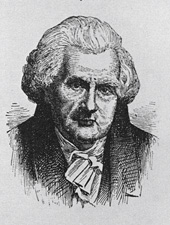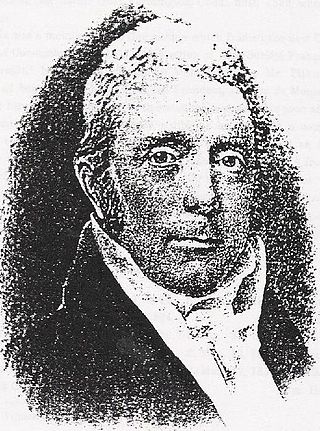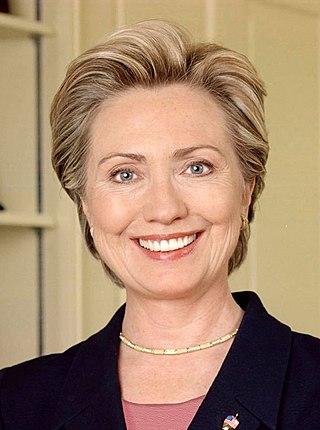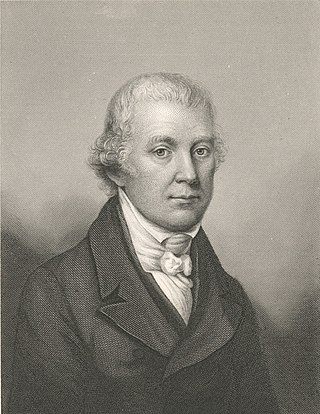
Samuel Ward King was the 15th Governor of Rhode Island from 1839 to 1843.

The Hartford Convention was a series of meetings from December 15, 1814, to January 5, 1815, in Hartford, Connecticut, United States, in which the New England Federalist Party met to discuss their grievances concerning the ongoing War of 1812 and the political problems arising from the federal government's increasing power.
Joseph Stanton Jr. was a military officer, a United States senator of the Anti-Federalist faction and a United States Representative of the Democratic-Republican party.

Stephen Mix Mitchell was an American lawyer, jurist, and statesman from Wethersfield, Connecticut. He represented Connecticut in the Continental Congress and the U.S. Senate and was chief justice of the state's Supreme Court.
Benjamin Ames was the third governor of the U.S. state of Maine, who served from December 5, 1821, to January 2, 1822.

Opposition to the War of 1812 was widespread in the United States, especially in New England. Many New Englanders opposed the conflict on political, economic, and religious grounds. When the Embargo Act of 1807 failed to remedy the situation with the United Kingdom, with Britain refusing to rescind the Orders in Council (1807) and the French continuing their decrees, certain Democratic-Republicans known as war hawks felt compelled to persuade the United States government to declare war on the British. A number of contemporaries called it, "The second war for independence." Henry Clay and John Calhoun pushed a declaration of war through Congress, stressing the need to uphold American honor and independence. Speaking of the impact of the depressed cotton trade upon his fellow Southerners, Calhoun told Congress that:
Jonathan Russell was a United States representative from Massachusetts and diplomat. He served the 11th congressional district from 1821 to 1823 and was the first chair of the House Committee on Foreign Affairs.

Charles Collins Van Zandt was the 34th Governor of Rhode Island.
William Cahoon was an American judge and politician. He served as a U.S. representative from Vermont.

Henry Howard was an American lawyer and politician. He served as the 32nd Governor of Rhode Island from 1873 to 1875.

Nathan Fellows Dixon was an attorney and bank president from Westerly, Rhode Island. The son of Nathan F. Dixon and father of Nathan F. Dixon III, he was best known for his service as a United States representative from Rhode Island from 1849 to 1851, and again from 1863 to 1871.

Manton is a residential neighborhood in Providence, Rhode Island and part of Johnston, Rhode Island. It is in the westernmost part of the city. of Providence The town of North Providence borders it to the north, Johnston to the west, while the neighborhoods of Hartford, Olneyville, and Mount Pleasant border it inside Providence. Separating it from other Providence neighborhoods to its east are Rushmore Ave, Chalkstone Ave, Smith Street, and the Triggs Memorial Golf Course. The Woonasquatucket River separates it from Johnston to the west.

Charles Jackson was the 18th Governor of Rhode Island from 1845 to 1846.

The 2008 Rhode Island Democratic presidential primary took place on March 4, 2008. It was an open primary. 21 delegates were awarded on a proportional basis. Rhode Island's delegation to the 2008 Democratic National Convention also included 11 superdelegates whose votes were not bound by the results of the primary election. Hillary Clinton won the primary.

Daniel Lyman (1756–1830) was a New England soldier, Chief Justice of the Rhode Island Supreme Court and member of the secessionist Hartford Convention.

Samuel Ward Jr. was an American Revolutionary War soldier, politician, and delegate to the secessionist Hartford Convention.

The 2012 United States presidential election in Rhode Island took place on November 6, 2012, as part of the 2012 United States presidential election in which all 50 states plus the District of Columbia participated. Rhode Island voters chose four electors to represent them in the Electoral College via a popular vote pitting incumbent Democratic President Barack Obama and his running mate, Vice President Joe Biden, against Republican challenger and former Massachusetts Governor Mitt Romney and his running mate, Congressman Paul Ryan.

The 2020 United States presidential election in Rhode Island was held on Tuesday, November 3, 2020, as part of the 2020 United States presidential election in which all 50 states plus the District of Columbia participated. Rhode Island voters chose electors to represent them in the Electoral College via a popular vote, pitting the Republican Party's nominee, incumbent President Donald Trump, and running mate Vice President Mike Pence against Democratic Party nominee, former Vice President Joe Biden, and his running mate California Senator Kamala Harris. Rhode Island has four electoral votes in the Electoral College.

The 2020 Rhode Island Democratic presidential primary took place on June 2, 2020, after being postponed due to concerns about the coronavirus pandemic, as one of eight delayed and regular primaries on the same day in the Democratic Party primaries for the 2020 presidential election. It was originally planned to take place on April 28, 2020, as one of several northeastern states in the "Acela primary". The Rhode Island primary was a semi-closed primary, with the state awarding 35 delegates, of whom 26 were pledged delegates allocated on the basis of the primary results.
This page is based on this
Wikipedia article Text is available under the
CC BY-SA 4.0 license; additional terms may apply.
Images, videos and audio are available under their respective licenses.














